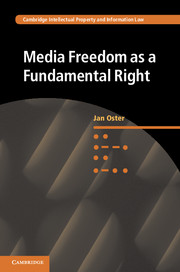Book contents
- Frontmatter
- Contents
- Preface and acknowledgements
- Table of cases
- Treaties, Conventions, Declarations and Statutes
- Reports and other documentary sources
- Introduction: aim, scope and method
- Part I The theoretical foundations of media freedom
- 1 The rationales for freedom of expression
- 2 Theory of media freedom
- Part II General rules on media freedom
- Part III Specific limitations to media freedom
- Conclusion: tenets of a Media Freedom Principle
- Bibliography
- Index
- Cambridge Intellectual Property and Information Law
1 - The rationales for freedom of expression
from Part I - The theoretical foundations of media freedom
Published online by Cambridge University Press: 05 June 2015
- Frontmatter
- Contents
- Preface and acknowledgements
- Table of cases
- Treaties, Conventions, Declarations and Statutes
- Reports and other documentary sources
- Introduction: aim, scope and method
- Part I The theoretical foundations of media freedom
- 1 The rationales for freedom of expression
- 2 Theory of media freedom
- Part II General rules on media freedom
- Part III Specific limitations to media freedom
- Conclusion: tenets of a Media Freedom Principle
- Bibliography
- Index
- Cambridge Intellectual Property and Information Law
Summary
‘The media’ is a differentiated system of human communication. It holds a special role in the framework of human communication because of its ability to disseminate information and ideas to a mass audience at a distance, and to issue such publications on a periodical basis. By means of mass communication, such as the printing press, broadcasting and now also the internet, the media liberates speech acts from spatiotemporal limitations and makes them available for an indefinite, general public. A theory that explains media freedom as a distinct fundamental right must thus have recourse to the rationales of freedom of expression as the general freedom to communicate. Two fundamental questions need to be distinguished: Why should speech be protected, and how should it be protected?
Why is speech protected?
According to well-rehearsed scholarship, freedom of expression may largely be based on three main conceptions: the argument from democracy, the argument from truth, including its sub-category, the ‘marketplace of ideas’, and the argument from individual autonomy or ‘self-fulfilment’. Yet upon closer examination, it becomes clear that these well-known labels do not provide clear-cut answers to all phenomena of speech alike. Therefore, in order to achieve full understanding of freedom of expression theory, and consequently of media freedom, two antithetical free speech philosophies can be distinguished along the following lines: the approaches tend to stress
• either the individual or the social interest of freedom of expression;
• that freedom of expression is either an end in itself or merely a means to an end; and
• that either the interest of the speaker alone or the effects of speech on society in general determine the moral value of speech.
For the purposes of presentation, these approaches are stylised as the ‘deontological’ versus the ‘consequentialist’ approach to freedom of expression.
- Type
- Chapter
- Information
- Media Freedom as a Fundamental Right , pp. 13 - 23Publisher: Cambridge University PressPrint publication year: 2015
- 1
- Cited by



